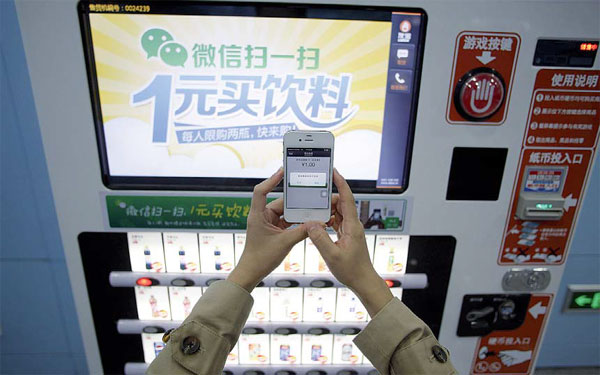WeChat banks on African money transfers
China's leading internet-based mobile messaging platform WeChat, operated by web giant Tencent, is betting on e-commerce and mobile banking to grow its presence in the African market.
The WeChat app which was launched in Africa in 2013 through a partnership with Naspers, a South African e-commerce and media group, is focusing on money transfers, prepaid electricity, airtime and purchases of goods to enlarge its footprint.
Last year, the company launched WeChat Wallet in South Africa, a payment solution within the app, with functionality that aims to replicate WeChat Pay.
WeChat Wallet allows users to store bank cards and withdraw cash at the ATMs of Standard Bank, South Africa's largest bank, operating in 20 countries across Africa.
|
A customer uses WeChat Pay to buy a beverage from a vending machine in Beijing. Xinhua |
"Through WeChat Wallet, we have made the process of sending and receiving money easier and affordable," says Brett Loubser, head of WeChat Africa.
Loubser says financial access in South Africa remains a challenge, owing to long trips to banking facilities and long lines.
According to the 2014 Finscope South Africa report, only 2.7 million people out of an adult population of 36.8 million have access to credit cards; hence a majority are unable to participate in e-commerce.
"With WeChat Wallet, we have bridged the divide between the banked and unbanked. Customers can top up their WeChat Wallets at major retailers and Standard Bank ATMs," he says.
In addition to WeChat Wallet, the company introduced offline-to-online transactions, where customers can buy goods from offline media such as magazines and TV.
This led to launch of a campaign, in partnership with Stuff Magazine and retailer Incredible Connection, where readers could buy products from magazine advertisements and have them delivered to their homes. This is in addition to buying Future life products through television advertisements.
The six-month campaign, Loubser says, yielded great results for the three brands, even though he didn't disclose the impact to WeChat, in terms of subscription numbers.
"Through our payment platform, we closed the gap between offline discovery and online commerce and made it easier for brands to drive sales," says Loubser.
The company also joined forces with McDonald's South Africa to pilot mobile payments at select flagship restaurants in Johannesburg and Cape Town.
Loubser adds that plans are underway to expand the payment option across several additional McDonald's restaurants, with the objective of rolling it out nationally in 2017.
For now, Loubser says WeChat will focus on driving adoption of WeChat Wallet in South Africa, after which they will expand to other countries.
"With the economic divide and massive economic inequality, South Africa provides a unique climate that allows us to reach two markets in one country. Once we have built a solid footprint, we will be able to replicate the success elsewhere," he says.
However, it's not party time for WeChat just yet. Arthur Goldstuck, managing director of World Wide Worx, a research firm based in South Africa, says WeChat should push all its advantages and differentiators more heavily in order to penetrate the African market.
"WeChat must make more of its functionality as a mobile payment and money transfer service, work toward regulatory approval as widely as possible and market that benefit intensively," he says.
Despite the fact that WeChat offers several features that make it a business and workplace communication tool, unlike US competitor WhatsApp, Goldstuck says the features do not necessarily give the app an advantage outside China. He says it's only after its pervasive use for communication that WeChat will be leveraged as a business tool in Africa.
He says WhatsApp has become so pervasive that many people do not see the need to use a new instant messaging service. And if they do, it will usually be Facebook Messenger, since most already have Facebook accounts.
"Because WeChat is generally not a transactional tool in Africa, it does not offer the utility it does in China. It is also not embedded in communications culture across the continent the way it is in China, largely because, it is part of a broader social networking ecosystem," he notes.

























